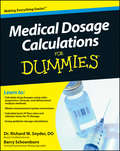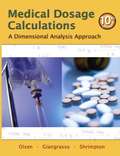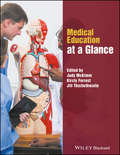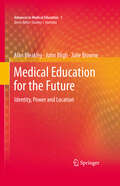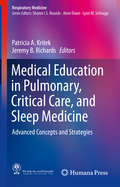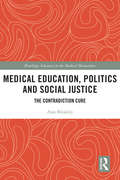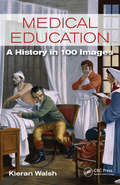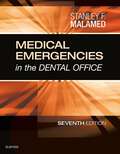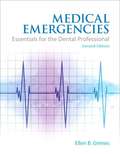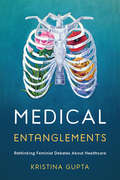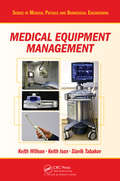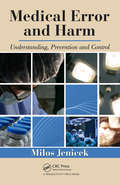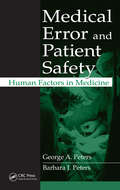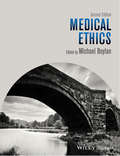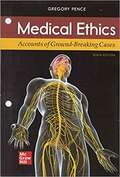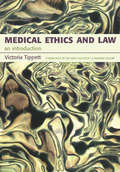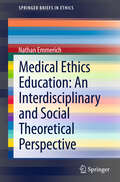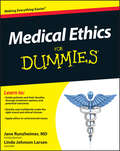- Table View
- List View
Medical Dosage Calculations For Dummies
by DO Barry Schoenborn Dr Richard W. SnyderScore your highest in a medical dosage calculations course A recent shortage of nurses in a society with an aging population has triggered the demand for students to enter the field of medical study. A dosage calculations course is required for most students earning an applied science degree in nursing, pharmacology, or paramedic programs. Medical Dosage Calculations For Dummies tracks a typical dosage calculations course and provides helpful content in an approachable and easy-to-understand format. Plus, you'll get examples of the various calculations made to determine the appropriate quantity of drug or solution that should be administered to patients. Calculating drug dosages utilizing ratio-proportion, formula, and dimensional analysis Systems of measurement, including metric and apothecary and other conversion equivalents for a global audience The ins and outs of the charting systems for MAR (Medicine Administration Records) If you're one of the hundreds of thousands of students aspiring to enter the medical field, Medical Dosage Calculations For Dummies is your ticket for scoring your highest on exams.
Medical Dosage Calculations: A Dimensional Analysis Approach
by Dolores Shrimpton Anthony Giangrasso June Olsen Emeritus RnThe complete and user-friendly guide to safe drug dosage calculation Fully revised for current practices and medication, Medical Dosage Calculations remains the field’s most complete, user-friendly and accessible drug calculation text and workbook. Using the dimensional analysis format it pioneered, students begin with simple arithmetic, progressing to the most complex drug calculations. As they develop mathematical skills for accurate dosage calculations, they also gain a thorough professional understanding of safe drug administration. Compared with competitors, our text contains deeper, more realistic problems, incorporating actual dosages and requiring real critical thinking.
Medical Dosage Calculations: A Dimensional Analysis Approach (10th Edition)
by June L. Olsen Anthony P. Giangrasso Dolores ShrimptonFully revised for current practices and medication, this MEDICAL DOSAGE CALCULATIONS: A DIMENSIONAL ANALYSIS APPROACH, 10/e remains the field's most complete, user-friendly and accessible drug calculation text and workbook. Using the dimensional analysis format it pioneered, students begin with simple arithmetic, progressing to the most complex drug calculations. As they develop mathematical skills for accurate dosage calculations, they also gain a thorough professional understanding of safe drug administration. Compared with competitors, our text contains deeper, more realistic problems, incorporating actual dosages and requiring real critical thinking. Coverage includes titrations, IV push, VCC, and other complex calculations. Updates include: revised safety recommendations and insulin cover, new equipment and labeling photos; and 0. 5 mL and needleless syringes. Pedagogical aids include case studies, self-tests, and a website for student resources.
Medical Education at a Glance
by Judy Mckimm Kirsty Forrest Jill ThistlethwaiteCovering the core concepts, activities and approaches involved in medical education, Medical Education at a Glance provides a concise, accessible introduction to this rapidly expanding area of study and practice. This brand new title from the best-selling at a Glance series covers the range of essential medical education topics which students, trainees, new lecturers and clinical teachers need to know. Written by an experienced author team, Medical Education at a Glance is structured under the major themes of the discipline including teaching skills, learning theory,and assessment, making it an easy-to-digest guide to the practical skills and theory of medical education, teaching and learning. Medical Education at a Glance: Presents core information in a highly visual way, with key concepts and terminology explained. Is a useful companion to the Association for the Study of Medical Education’s (ASME) book Understanding Medical Education. Covers a wide range of topics and themes. Is a perfect guide for teaching and learning in both the classroom and clinical setting.
Medical Education for the Future
by Alan Bleakley John Bligh Julie BrowneThe purpose of medical education is to benefit patients by improving the work of doctors. Patient centeredness is a centuries old concept in medicine, but there is still a long way to go before medical education can truly be said to be patient centered. Ensuring the centrality of the patient is a particular challenge during medical education, when students are still forming an identity as trainee doctors, and conservative attitudes towards medicine and education are common amongst medical teachers, making it hard to bring about improvements. How can teachers, policy makers, researchers and doctors bring about lasting change that will restore the patient to the heart of medical education? The authors, experienced medical educators, explore the role of the patient in medical education in terms of identity, power and location. Using innovative political, philosophical, cultural and literary critical frameworks that have previously never been applied so consistently to the field, the authors provide a fundamental reconceptualisation of medical teaching and learning, with an emphasis upon learning at the bedside and in the clinic. They offer a wealth of practical and conceptual insights into the three-way relationship between patients, students and teachers, setting out a radical and exciting approach to a medical education for the future. "The authors provide us with a masterful reconceptualization of medical education that challenges traditional notions about teaching and learning. The book critiques current practices and offers new approaches to medical education based upon sociocultural research and theory. This thought provoking narrative advances the case for reform and is a must read for anyone involved in medical education." - David M. Irby, PhD, Vice Dean for Education, University of California, San Francisco School of Medicine; and co-author of Educating Physicians: A Call for Reform of Medical School and Residency "This book is a truly visionary contribution to the Flexner centenary. It is compulsory reading for the medical educationalist with a serious concern for the future - and for the welfare of patients and learners in the here and now." Professor Tim Dornan, University of Manchester Medical School and Maastricht University Graduate School of Health Professions Education.
Medical Education in Geriatrics: Strategies for Teaching the Care of Older Adults
by Andrea Wershof SchwartzMedical Education in Geriatrics: Strategies for Teaching the Care of Older Adults provides an overview of evidence-based strategies for teaching geriatrics in medical education. This book is for clinician educators: both for those with geriatrics expertise seeking to increase their knowledge and skill in education, and for those medical educators seeking to expand their knowledge of how to teach geriatric principles to their learners and thereby prepare them to care for older adults. Written by experts and leaders in Geriatric Medical Education from across the US and Canada, Medical Education in Geriatrics highlights approaches for creating effective educational experiences in geriatrics for learners ranging from pre-clinical medical students, through residency, fellowship and continuing medical education, as well as interprofessional education, with an emphasis on evidence-based, engaging and memorable teaching strategies. The book also provides strategies for teaching geriatrics in a variety of settings, including the hospital, outpatient settings, nursing home, home care, and telemedicine. Additional chapters address considerations in teaching geriatrics, including Diversity, Equity and Inclusion, Providing Feedback, assessment in geriatric medical education, online resources, and other topics that will help educators deliver excellent medical education in geriatrics. Medical Education in Geriatrics: Strategies for Teaching the Care of Older Adults provides practical and evidence-based strategies for teaching principles of geriatrics in a variety of settings and will be a valuable and practical resource for geriatricians, palliative medicine specialists and trainees, family medicine and internal medicine clinicians and medical educators, medical educators in pre-clinical and clinical settings, residency and fellowship directors, and medical students and residents interested in geriatrics and the care of older adults.
Medical Education in Pulmonary, Critical Care, and Sleep Medicine: Advanced Concepts and Strategies (Respiratory Medicine)
by Jeremy B. Richards Patricia A. KritekThis is a book for clinician educators. It offers modern, evidence-based practices to use in teaching learners at a range of levels, with an emphasis on concrete strategies that teachers can implement in their own clinical practices as well as in small and large group settings. Medical education is rapidly changing with emerging evidence on best practices and a proliferation of new technologies. As strategies for effectively teaching medical learners evolve, it is important to understand the implications for Pulmonary, Critical Care, and Sleep Medicine (PCCM). This text is structured to allow easy access to the reader. Chapters are organized around level of learner (e.g., medical student to PCCM fellow to practicing physicians) as well as the location of teaching. Given the variety of clinical settings in which PCCM physicians teach, specific consideration of best practices, broad changes in curricular design and pedagogy are considered in different clinical contexts. Each chapter begins with a focus on why the topic is important for clinician educators. A review of the available evidence and relevant medical education theory about the topic follows, with examples from specific studies that provide insight into best practices regarding the concepts and topics discussed in the chapter. For chapters focusing on learners, different environments are considered and similarly, if the focus is on the learning environment, attention is paid to the approach to different learners. Each chapter ends with a summary of the primary points from the chapter and concrete examples of how clinician teachers can put the concepts discussed in the chapter into practice. This is an ideal guide for educators in pulmonary, critical care, and sleep medicine.
Medical Education, Politics and Social Justice: The Contradiction Cure (Routledge Advances in the Medical Humanities)
by Alan BleakleyThis book critically analyses how politics and power affect the ways that medicine is taught and learned. Challenging society’s historic reluctance to connect the realm of politics to the realm of medicine, Medical Education, Politics and Social Justice: The Contradiction Cure emphasizes the need for medical students to engage with social justice issues, including global health crises resulting from the climate emergency, and the health implications of widening social inequality. Arguing for an increased focus on community-based learning, rather than acute care, this innovative text maps the territory of medicine’s contradictory engagement with politics as a springboard for creative curriculum design. It demonstrates why the socially disempowered - such as political and climate refugees, the homeless, or those without health insurance should be primary subjects of attention for medical students, while exploring how political engagement can be refined, sharp, cultivated and creative, engaging imagination and demanding innovation Exploring how the medical humanities can promote engagement with politics to improve medical education, this book is a ground-breaking and inspiring contribution. It is an essential read for all those with a focus on medical education and medical humanities, as well as medical and healthcare students with an interest in the social determinants of health.
Medical Education: A Dictionary of Quotations
by Kieran WalshToday's students are tomorrow's doctors. The quality of education they receive is vitally important to the successful future of healthcare. Medical education as a discipline has a long history and has developed enormously in the past decade with the emergence of evidence-based teaching techniques, outcomes based curricula and assessment methods that are valid and reliable - however it will never be an exact science. It will always depend on enthusiastic teachers and ambitious learners who are hungry for new knowledge and skills. This thoroughly researched and fully referenced compendium of quotes has been specially selected to motivate and encourage medical educators who will find the themed structure vital in planning and delivering their courses. Students, too, will be inspired and nurtured in their learning.
Medical Education: A History in 100 Images (Oxford Textbook Ser.)
by Kieran WalshThis fascinating guide to medical education introduces the reader to the historical development of this important subject through 100 powerful images from the prestigious Wellcome Library Collection that highlight key figures in the field and innovations that have taken place, not just in the recent past but over the centuries. The readable text that accompanies each image both describes that image and shows how the ideas arising from it have helped to shape modern medical education, with relevance to current clinical practice. This will be an invaluable and visual introduction for students, academics, managers and practitioners looking to gain a better understanding of the evolution of educational practice in medicine, and how it might progress in the future.
Medical Emergencies Caused by Aquatic Animals
by Vidal HaddadThe present book is intended as a reference guide for emergency and ambulatory care medicine, providing essential information on the most important problems and incidents caused by venomous, poisoning and traumatic marine and freshwater animals. Indeed, though emergencies caused by aquatic animals are becoming increasingly common, there are few reference books devoted to providing medical guidance on them. The book includes a wealth of original images of injuries caused by aquatic animals, while the text covers the current state knowledge on the subject, including the identification of the animals, the clinical aspects of the envenomation/poisonings/injuries, first aid and emergency care, main treatment alternatives and a typical case representing each group of animals. Chapters are organized according to zoological groups: Marine and Freshwater Invertebrates (Porifera, Cnidarians, Annelida, Mollusks, Echinodermata) and Marine and Freshwater Vertebrates (Fish and Reptiles). Medical Emergencies Caused By Aquatic Animals: A Zoological and Clinical Guide is intended for students and professionals in Medicine (Dermatology, Tropical Medicine, Infectious Diseases and Emergency Medicine) and the Biological Sciences (Zoology and Ecology), as well as to practicing professionals working in coastal or freshwater areas.
Medical Emergencies Caused by Aquatic Animals: A Biological and Clinical Guide to Trauma and Envenomation Cases
by Vidal Haddad JuniorThis is the second edition of the book originally published under the title Medical Emergencies Caused by Aquatic Animals: A Zoological and Clinical Guide. Including updated chapters, new content and additional references, it discusses follow-up with patients, describes diseases that are not emergencies and explains procedures that can take place at health stations and outpatient centers, focusing on clinical and biological aspects relevant to researchers and practitioners alike. The chapter on Invertebrate Aquatic Animals presents facts and advances that were left out of the first edition. In addition, it includes improved images. The subtopic on Cnidaria presents recent data on outbreaks and new species identification in unprecedented areas, with a timely discussion on first aid treatment. The chapter on Injuries by Vertebrate Aquatic Animals has been improved, based on continued work with bathers and fishermen. Featuring numerous images and representative clinical cases, it explores the most significant injuries caused by fish around the globe. The chapter on Ingestion of Aquatic Venomous Animals: Toxinology, Clinical Aspects, and Treatment discusses outbreaks of intoxication diseases from eating fish and seafood, drawing on reliable records of serial cases of Haff's syndrome, scombroidism and ciguatera. Further, it examines the indiscriminate consumption of aquatic animals, which the author argues present the same (or even greater) risks of poisoning and infections as terrestrial animals. Lastly, since there is a general lack of awareness of the risk of infections in aquatic environments, the chapter on Bacterial and Fungal Infections in Aquatic Environments describes the symptoms and treatments and highlights preventive measures.
Medical Emergencies in the Dental Office
by Stanley F. MalamedBe prepared to handle life-threatening dental emergencies! Medical Emergencies in the Dental Office, 7th Edition helps you learn the skills needed to manage medical emergencies in the dental office or clinic. It describes how to recognize and manage medical emergencies promptly and proactively, and details the resources that must be on hand to deal effectively with these situations. This edition includes new guidelines for drug-related emergencies, cardiac arrest, and more. Written by respected educator Dr. Stanley Malamed, this expert resource provides dental professionals with the tools for implementing a basic action plan for managing medical emergencies.
Medical Emergencies: Essentials for the Dental Professional (Second Edition)
by Ellen B. GrimesUpdated for the latest knowledge and practice standards, MEDICAL EMERGENCIES: ESSENTIALS FOR THE DENTAL PROFESSIONAL, 2/e thoroughly discusses the essential elements of 30 different medical emergencies dental professionals may encounter, including etiology, signs, symptoms and treatment. It presents case scenarios and resolutions designed to promote critical thinking and problem solving; demonstrates the importance medical histories and vital signs in preventing emergencies; and guides students in developing appropriate medical emergency kits. Case Scenarios and Case Resolutions promote critical thinking skills Critical thinking is in the previous sentence, and easy-to-follow Treatment Flow Charts walk students visually through emergency procedures. Easy-to-use tables present the Signs & Symptoms of each emergency, and an At-A-Glance table summarizes the essentials of all emergencies. Student practice tests are now offered online, and extensive instructor support materials are available, including PowerPoint® presentations for each chapter.
Medical Entanglements: Rethinking Feminist Debates about Healthcare
by Kristina GuptaMedical Entanglements uses intersectional feminist, queer, and crip theory to move beyond “for or against” approaches to medical intervention. Using a series of case studies – sex-confirmation surgery, pharmaceutical treatments for sexual dissatisfaction, and weight loss interventions – the book argues that, because of systemic inequality, most mainstream medical interventions will simultaneously reinforce social inequality and alleviate some individual suffering. The book demonstrates that there is no way to think ourselves out of this conundrum as the contradictions are a product of unjust systems. Thus, Gupta argues that feminist activists and theorists should allow individuals to choose whether to use a particular intervention, while directing their social justice efforts at dismantling systems of oppression and at ensuring that all people, regardless of race, gender, sexuality, class, or ability, have access to the basic resources required to flourish.
Medical Entomology in Asia (Entomology Monographs)
by Kyoko Sawabe Chizu Sanjoba Yukiko HigaThis book presents the latest findings in medical entomology in Japan and neighboring Asian countries. It provides an overview of the current issues of medically important arthropods in this region and also refers to the issues that are likely to become more serious in the near future. It helps us understand that addressing the arthropod issues is not enough in limited regions, but requires a coordinated response throughout these regions. Global warming and globalization are affecting both vector and vector-borne diseases, causing rapid changes in their distribution and ecology. From the perspective of global pest control, the book focuses not only on domestic pests in Japan but also on pests in neighboring Asian countries including the Philippines, Thailand, Taiwan, Vietnam, etc., which are geographically and economically close to Japan. Japan has experience of eradicating malaria and lymphatic filariasis, drastically reducing the number of cases of Japanese encephalitis patients, and succeeded in controlling flies in the metropolis of Tokyo. The know-how learned and created from these past successes should provide valuable information for other parts of Asia that are still struggling with pest infestation today. With the growing interest in these issues worldwide, this book provides essential information in medical entomology for researchers, including students and early career researchers. By integrating the latest findings in medical entomology with past successes and experiences in the field, the book is also a valuable reference for many professionals planning sustainable pest control.
Medical Equipment Management (Series in Medical Physics and Biomedical Engineering)
by Keith Willson Keith Ison Slavik TabakovKnow What to Expect When Managing Medical Equipment and Healthcare Technology in Your OrganizationAs medical technology in clinical care becomes more complex, clinical professionals and support staff must know how to keep patients safe and equipment working in the clinical environment. Accessible to all healthcare professionals and managers, Medica
Medical Error and Harm: Understanding, Prevention, and Control
by Milos JenicekRecent debate over healthcare and its spiraling costs has brought medical error into the spotlight as an indicator of everything that is ineffective, inhumane, and wasteful about modern medicine. But while the tendency is to blame it all on human error, it is a much more complex problem that involves overburdened systems, constantly changing techno
Medical Error and Patient Safety: Human Factors in Medicine
by George A. Peters Barbara J. PetersA difficult and recalcitrant phenomenon, medical error causes pervasive and expensive problems in terms of patient injury, ineffective treatment, and rising healthcare costs. Simple heightened awareness can help, but it requires organized, effective remedies and countermeasures that are reasonable, acceptable, and adaptable to see a truly significa
Medical Ethics
by Michael BoylanThe second edition of Medical Ethics deals accessibly with a broad range of significant issues in bioethics, and presents the reader with the latest developments. This new edition has been greatly revised and updated, with half of the sections written specifically for this new volume.An accessible introduction for beginners, offering a combination of important established essays and new essays commissioned especially for this volumeGreatly revised - half of the selections are new to this edition, including two essays on genetic enhancement and a section on gender, race and cultureIncludes new material on ethical theory as a grounding for understanding the ethical dimensions of medicine and healthcareNow includes a short story on organ allocation, providing a vivid approach to the issue for readersProvides students with the tools to write their own case study essaysAn original section on health provides a theoretical context for the succeeding essaysPresents a carefully selected set of readings designed to progressively move the reader to competency in subject comprehension and essay writing
Medical Ethics
by Raimondo G. RussoMedical practitioners have always been expected to abide by certain standards of conduct and uphold certain values, more or less throughout the world. In this book, besides discussing specific ethical issues, the author ponders questions such as the right to life and the integrity of the human person. Ethics in medicine takes account of the principles that underlie the best decisions, particularly in unusual circumstances – such as a pandemic. Many of these are enshrouded in the oaths most doctors take – the Hippocratic Oath is perhaps the best known, and has influenced numerous others over the centuries. However, these principles and the resulting conduct have taken different directions at various moments in history and in different parts of the globe, though always primarily oriented to the protection of human health. The author compares some interesting similarities and differences, tracing the main social, legal and religious attitudes, in what has come to be known as"medical ethics", with all its benefits to Mankind. Alongside basic human dignity, four main values have been pivotal in medical ethics: Caring for sick people, putting their well-being at the center of concern, and doing good. Not causing harm: never making a patient take risks, and never prescribing a doubtful treatment. Fairness: treating all patients in accordance with their health needs, never favoring or neglecting anyone on the basis of background, occupation, etc. Self-determination: the patient can be informed about treatments and, when possible, should approve the prescriptions. The doctor must show empathy, respect for confidentiality, and responsibility. Briefly, this overview of the medical profession’s ethics focuses on experience, principles, aims, virtues and above all the basic rules which in various places through the centuries have governed the tortuous paths of Mankind. Written byan acclaimed expert in the field, this book is of value for all those working in healthcare, and people interested in its ethics.
Medical Ethics Accounts Ground-Breaking Cases
by Gregory E. PenceMedical Ethics: Accounts of Ground-Breaking Cases | Ninth Edition
Medical Ethics And Law: An Introduction
by Victoria TippettThis book is to help you understand the main ethical and legal details you need to know in order to practice medicine safely and well. Medical ethics is an inherently fascinating subject, and throws up new issues every day. Good ethical thinking requires practice and application and there are essentials that are easy to grasp and learn quickly - this book will show you how. It contains short summaries, with examples, and guidance on your legal position, of a series of core topics of medical ethics and law. Its aim is to give you some guides to effective, safe and good clinical practice.
Medical Ethics Education: An Interdisciplinary and Social Theoretical Perspective
by Nathan EmmerichThere is a diversity of 'ethical practices' within medicine as an institutionalised profession as well as a need for ethical specialists both in practice as well as in institutionalised roles. This Brief offers a social perspective on medical ethics education. It discusses a range of concepts relevant to educational theory and thus provides a basic illumination of the subject. Recent research in the sociology of medical education and the social theory of Pierre Bourdieu are covered. In the end, the themes of Bourdieuan Social Theory, socio-cultural apprenticeships and the 'characterological turn' in medical education are draw together the context of medical ethics education.
Medical Ethics For Dummies
by Linda Johnson Larsen Jane RunzheimerA practical, insightful guide to the moral and ethical standards of healthcareSucceeding in the healthcare field means more than just making a diagnosis and writing a prescription. Healthcare professionals are responsible for convincing patients and their family members of the best course of action and treatments to follow, while knowing how to make the right moral and ethical choices, and so much more. Unlike daunting and expensive texts, Medical Ethics For Dummies offers an accessible and affordable course supplement for anyone studying medical or biomedical ethics.* Follows typical medical and biomedical ethics courses* Covers real ethical dilemmas doctors, nurses and other healthcare workers may face* Includes moral issues surrounding stem cell research, genetic engineering, euthanasia, and morePacked with helpful information, Medical Ethics For Dummies arms aspiring medical professionals with the philosophical and practical foundation for advancing in a field where critical ethical and moral decisions need to be rapidly and convincingly made.
